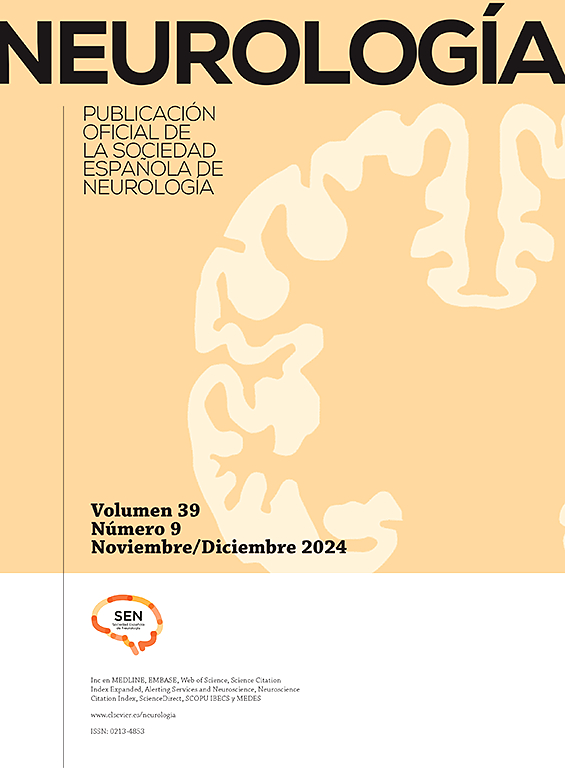Periodontal disease and brain amyloid pathology in mild cognitive impairment
IF 3.1
4区 医学
Q2 CLINICAL NEUROLOGY
引用次数: 0
Abstract
Introduction
Increases in brain β-amyloid protein (Aβ) levels have been demonstrated in animal models following oral inoculation of periodontopathogens or their enzyme gingipain. We investigated the association between periodontitis and brain Aβ protein levels in mild cognitive impairment (MCI).
Methods
An observational study was designed. All participants underwent a periodontal examination and an amyloid-PET scan. Subsequently, the following groups were established: MCI and suspected Alzheimer disease (AD) (MCI/Aβ+ group) (n = 45); MCI and suspected non-AD pathology (MCI/Aβ– group) (n = 59); cognitively healthy elderly individuals with negative PET-amyloid scan results (non-MCI/Aβ– group) (n = 60).
Results
Patients with moderate-severe periodontitis had a higher risk of abnormal accumulation of Aβ in the brain, with an odds ratio (OR) of 3.30 (95% confidence interval [CI], 1.30–8.26) when comparing patients from the MCI/Aβ+ and MCI/Aβ– groups, and an OR of 4.94 (95% CI, 1.65–14.84) when comparing the MCI/Aβ+ group against the non-MCI/Aβ– group.
Conclusions
Our findings suggest that periodontal disease may be associated with anomalous accumulation of cerebral Aβ protein in older people, independently of cognitive impairment.
轻度认知障碍的牙周病和脑淀粉样蛋白病理
在动物模型中,口腔接种牙周病病原体或其酶牙龈蛋白酶后,脑β-淀粉样蛋白(Aβ)水平升高。我们研究了轻度认知障碍(MCI)患者牙周炎与脑Aβ蛋白水平之间的关系。方法设计观察性研究。所有参与者都接受了牙周检查和淀粉样蛋白pet扫描。随后,建立以下组:MCI和疑似阿尔茨海默病(AD) (MCI/Aβ+组)(n = 45);MCI和疑似非ad病理(MCI/Aβ -组)(n = 59);认知健康老年人pet -淀粉样蛋白扫描结果阴性(非mci /Aβ -组)(n = 60)。结果中重度牙周炎患者发生脑内a β异常积聚的风险较高,MCI/ a β+组和MCI/ a β -组的比值比(OR)为3.30(95%可信区间[CI], 1.30 ~ 8.26), MCI/ a β+组与非MCI/ a β -组的比值比(OR)为4.94 (95% CI, 1.65 ~ 14.84)。结论牙周病可能与老年人大脑Aβ蛋白异常积累有关,与认知障碍无关。
本文章由计算机程序翻译,如有差异,请以英文原文为准。
求助全文
约1分钟内获得全文
求助全文
来源期刊

Neurologia
医学-临床神经学
CiteScore
5.90
自引率
2.60%
发文量
135
审稿时长
48 days
期刊介绍:
Neurología es la revista oficial de la Sociedad Española de Neurología y publica, desde 1986 contribuciones científicas en el campo de la neurología clínica y experimental. Los contenidos de Neurología abarcan desde la neuroepidemiología, la clínica neurológica, la gestión y asistencia neurológica y la terapéutica, a la investigación básica en neurociencias aplicada a la neurología. Las áreas temáticas de la revistas incluyen la neurologia infantil, la neuropsicología, la neurorehabilitación y la neurogeriatría. Los artículos publicados en Neurología siguen un proceso de revisión por doble ciego a fin de que los trabajos sean seleccionados atendiendo a su calidad, originalidad e interés y así estén sometidos a un proceso de mejora. El formato de artículos incluye Editoriales, Originales, Revisiones y Cartas al Editor, Neurología es el vehículo de información científica de reconocida calidad en profesionales interesados en la neurología que utilizan el español, como demuestra su inclusión en los más prestigiosos y selectivos índices bibliográficos del mundo.
 求助内容:
求助内容: 应助结果提醒方式:
应助结果提醒方式:


